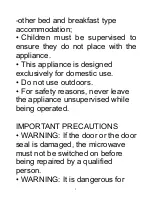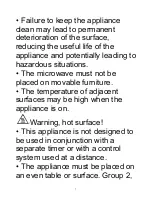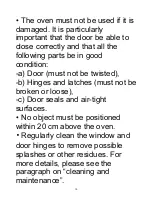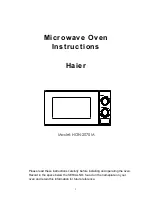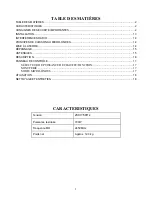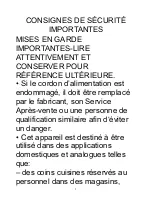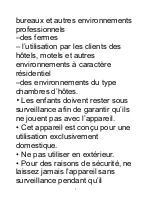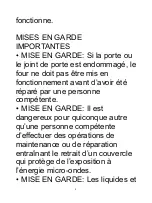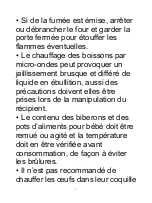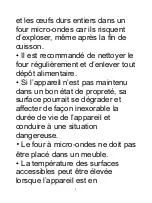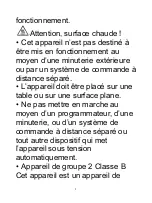
12
GROUNDING INSTRUCTIONS
This appliance must be grounded. This oven is equipped with a cord having a grounding wire with a
grounding plug. It must be plugged into a wall receptacle that is properly installed and grounded. In the
event of an electrical short circuit, grounding reduces risk of electric shock by providing an escape wire
for the electric current. It is recommended that a separate circuit serving only the oven be provided. Using
a high voltage is dangerous and may result in a fire or other accident causing oven damage.
WARNING
Improper use of the grounding plug can result in a risk of electric shock.
Note:
1.
If you have any questions about the grounding or electrical instructions, consult a qualified
electrician or service person.
2.
Neither the manufacturer nor the dealer can accept any liability for damage to the oven or personal
injury resulting from failure to observe the electrical connection procedures.
The wires in this cable main are colored in accordance with the following code:
Green and Yellow = EARTH
Blue = NEUTRAL
Brown = LIVE
BEFORE YOU CALL FOR SERVICE
If the oven fails to operate:
1.
Check to ensure that the oven is plugged in securely. If it is not, remove the plug from the outlet, wait
10 seconds, and plug it in again securely.
2.
Check for a blown circuit fuse or a tripped main circuit breaker. If these seem to be operating
properly, test the outlet with another appliance.
3.
Check to ensure that the control panel is programmed correctly and the timer is set.
4.
Check to ensure that the door is securely closed engaging the door safety lock system. Otherwise,
the microwave energy will not flow into the oven.
IF NONE OF THE ABOVE RECTIFIES THE SITUATION, THEN CONTACT A QUALIFIED TECHNICIAN.
DO NOT TRY TO ADJUST OR REPAIR THE OVEN YOURSELF.
UTENSILS GUIDE
1.
The ideal material for a microwave utensil is transparent to microwave, it allows energy to pass
through the container and heat the food.
2. Microwave cannot penetrate metal, so metal utensils or dishes with metallic trim should not be used.
3. Do not use recycled paper products when microwave cooking, as they may contain small metal
fragments which may cause sparks and/or fires.
4. Round /oval dishes rather than square/oblong ones are recommend, as food in corners tends to
overcook.
5.
Narrow strips of aluminum foil may be used to prevent overcooking of exposed areas. But be careful
don’t use too much and keep a distance of 1 inch (2.54cm) between foil and cavity.
The list below is a general guide to help you select the correct utensils.




